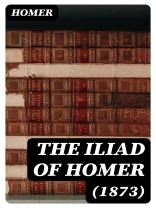Homer’s ‘The Iliad of Homer’ (1873) stands as a monumental epic that explores the complexities of heroism, fate, and the human condition against the backdrop of the Trojan War. Written in dactylic hexameter, this ancient text intricately weaves a narrative rich with poignant characterizations and profound themes. The vivid depictions of battlefield valor and the emotional turmoil of its protagonists highlight the intricate interplay between glory and suffering, showcasing Homer’s unparalleled storytelling prowess. The work has profoundly influenced Western literature, setting the foundation for the epic genre and serving as a cultural touchstone for the exploration of ethical and existential dilemmas in times of conflict. Homer, traditionally credited as the author of this epic, is a figure shrouded in mystery, believed to have lived during the 8th century BCE. His profound understanding of human nature, combined with an oral tradition steeped in myth and legend, undoubtedly informed the creation of ‘The Iliad.’ The themes of war and honor resonate through the ages, reflecting the societal values of ancient Greece while addressing universal truths that resonate even today. This masterwork is an essential read for anyone seeking to comprehend the roots of Western literature and the enduring questions of morality, fate, and human emotion. ‘The Iliad of Homer’ not only offers a gripping narrative but also serves as a reflective mirror for modern readers, inviting them to explore their own understanding of conflict and courage.
Circa l’autore
Homer, the venerated and enigmatic figure of ancient Greek literature, is traditionally thought to be the author of the two cornerstone epic poems of Greek—and indeed Western—literature: the ‘Iliad’ and the ‘Odyssey.’ Despite the debate over Homer’s existence and blind bard persona, his influence is palpable across centuries. The ‘Iliad, ‘ often cited with Richmond Lattimore’s influential translation ‘The Iliad of Homer’ (1951), not the 1873 edition, is a tale of the Trojan War, encompassing themes of heroism, glory, and the fickle nature of the gods. Homeric style is distinguished by its use of dactylic hexameter, extended similes, and a rich formulaic language. The profound exploration of human nature and the divine, along with the pathos of the eternal struggle against fate and mortality, renders his work timeless. Generations of scholars have debated the ‘Homeric Question, ‘ concerning the authorship and origin of his epics, with some proposing that they are the culmination of a long oral tradition rather than the work of a single individual. Regardless of historicity, ‘Homer’ embodies not just a name but the inception of the epic narrative tradition and remains a seminal figure whose narratives continue to be studied, reinterpreted, and revered to this day.












